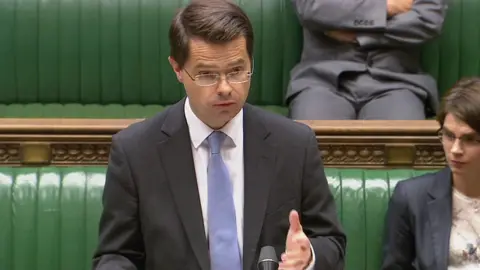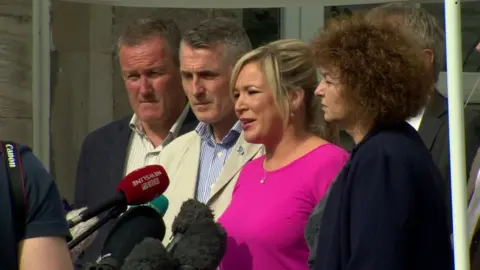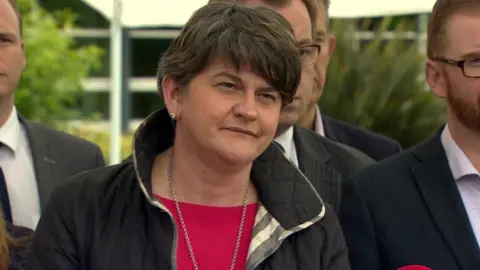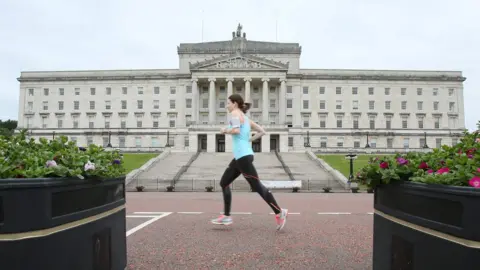Stormont power-sharing deal 'remains achievable'
 BBC
BBCThe Northern Ireland Secretary, James Brokenshire, has said he believes a deal between the parties in Northern Ireland "remains achievable".
Mr Brokenshire told the Commons legislation to enable a new executive at Stormont could come "as early as this week", adding "time is short".
He said he would not call an assembly election immediately but would keep his options under review.
Earlier, Sinn Féin said it was unlikely there will be a deal in the short term.
However, the DUP said the "onus" was on Sinn Féin.
Northern Ireland has been without a functioning devolved government since January, when the coalition led by the two biggest parties, the DUP and Sinn Féin collapsed, over a green energy scandal.
Mr Brokenshire updated MPs about what the next steps are in Stormont's power-sharing talks after parties missed last Thursday's statutory deadline to strike a deal.
"I continue to believe that a deal remains achievable. And if agreement is reached, I will bring forward legislation to enable an executive to be formed, possibly as early as this week," he said.

Mr Brokenshire also said "that if no agreement is reached, legislation in Westminster may then be required to give authority for the expenditure of Northern Ireland departments through an Appropriations Bill."
He said that "if we do not see resolution in the coming days, it is my strong view that those resources would need to be made available very soon. Accordingly, it would be my intention to make a further indicative budget statement to provide further clarity to the Northern Ireland Civil Service "

Analysis, BBC News NI business correspondent Julian O'Neill
Civil servants are currently controlling Northern Ireland's finances.
In the absence of a budget, 75% of the block grant has been released to them by the Treasury.
If there is no executive to pass a budget by the end of July, that will move to 95% - that leaves Northern Ireland looking at a potential £500m shortfall.

However, no-one really expects that to come to pass.
James Brokenshire has indicated Westminster will step in soon and impose a budget.
This would trigger the release of 100% of block grant funds of £10bn.
He said some spending decisions cannot be made by civil servants and are backing up, such as in the areas of health and education.
He also said £42m in infrastructure funding from the Autumn statement is unallocated due to no executive.

On the issue of donations to political parties, Mr Brokenshire said he intends to "bring forward legislation that will provide for the publication of all donations and loans received by Northern Ireland parties on or after 1 July 2017".
The Shadow Northern Ireland Secretary, Owen Smith, welcomed the government's statement but stressed more could be done by the prime minister. He told MPs that Theresa May should be more involved in the process and encouraged her to "get on a plane" and go to Northern Ireland.
Sinn Féin's northern leader, Michelle O'Neill, said Mr Brokenshire's comments were "most unhelpful".
"He is once again pandering to the DUP's delaying and blocking of the rights-based issues which are the heart of the current difficulties.
"He has also quite crassly let the DUP off the hook on the issue of the 'dark money' donation of over £400,000, which bought its support for Brexit.
"This latest evidence of a Tory side deal with the DUP comes on the heels of the DUP's support for cuts to the wages of emergency and public sector workers and support for a Tory Brexit."

'Path to direct rule'
SDLP leader Colum Eastwood said Mr Brokenshire's speech was "a statement setting out a path to direct rule".
"That will mean the north is at the mercy of a DUP/Tory coalition who haven't the slightest interest in either equality or fairness," he said.
"It is clear from recent days that the two big parties have come to the conclusion that an Autumn deal suits their needs better," Mr Eastwood added.
Ulster Unionist leader Robin Swann said the lack of clarity around the talks had been made "further unclear following the secretary of state's statement today."
He said the negotiation "seems to be a two-party process", and the other parties "can't be taken for granted", adding the "impasse between two larger parties is stalling politics in Northern Ireland".
The Alliance Party's Stephen Farry said Mr Brokenshire's statement represented "a missed opportunity".
"The statement doesn't address the fundamental reality that the talks in their current format seem to be at an impasse, with the DUP and Sinn Féin increasingly engaging in public recrimination," he said.
Mr Farry called for an independent chair to break the impasse between the DUP and Sinn Féin.
Earlier, DUP leader Arlene Foster said the "onus was on Sinn Féin".
"Either they can lead us into another election or they can lead us inexorably towards direct rule, and they know the consequences of that."
She also said she was "amazed to hear them (Sinn Féin) say that the DUP did not want to have rights for Irish language speakers".
"I have a great deal of respect for those people who love the Irish language, who want to use it everyday in their lives."
 AFP
AFPIn January, the late Martin McGuinness, of Sinn Féin, resigned in protest over the DUP's handling of an inquiry into the Renewable Heat Incentive scheme.
His party had demanded that DUP leader Arlene Foster step aside temporarily to allow an investigation into the scheme she set up, but Mrs Foster refused.
Over the past six months, and during two elections at Stormont and Westminster, the two parties have been deadlocked over a number of issues.
The most significant sticking points are disagreements over an Irish language act, same-sex marriage, a Bill of Rights and measures to deal with the legacy of the Troubles.
The secretary of state has the option of giving the parties more time to negotiate, calling another assembly election or reintroducing direct rule from Westminster.
